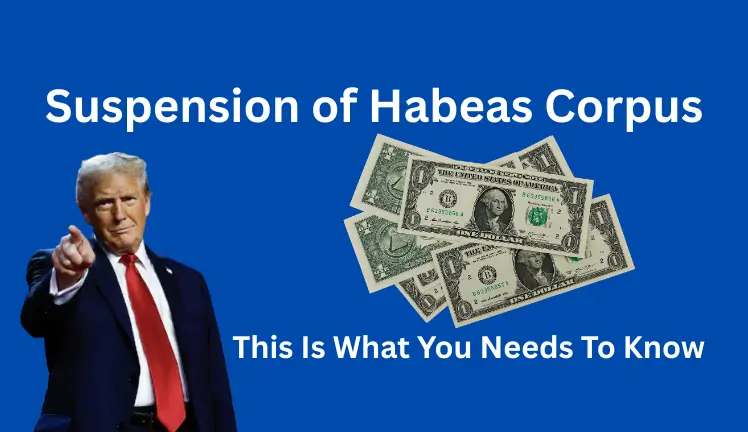Washington D.C. – May 10, 2025: The Trump administration is reportedly exploring the suspension of habeas corpus, a fundamental legal principle that allows individuals to challenge the legality of their detention. This controversial move was hinted at by Stephen Miller, a senior White House adviser, during a press briefing on Friday.

Miller emphasized that the Constitution permits the suspension of habeas corpus in cases of invasion or rebellion, indicating that the administration is considering this option as national security concerns escalate. “The constitution is clear, and that, of course, is the supreme law of the land, that the privilege of the writ of habeas corpus could be suspended in time of invasion. So that’s an option we’re actively looking at,” Miller stated.
What Is Habeas Corpus?
Habeas corpus, a Latin term meaning “you shall have the body,” is a legal mechanism that ensures individuals in custody are brought before a court to assess the legality of their detention. This principle is a cornerstone of the U.S. justice system, serving as a safeguard against arbitrary and unlawful detention.
Under the U.S. Constitution’s Suspension Clause, the writ of habeas corpus can only be suspended in cases of “rebellion or invasion” when public safety requires it. Historically, the writ has been suspended only four times in U.S. history, most notably by President Abraham Lincoln during the Civil War.
What Happens If Habeas Corpus Is Suspended?
If the Trump administration proceeds with suspending habeas corpus, it could have profound implications for civil liberties. Key consequences include:
- Indefinite Detention: Individuals could be detained without formal charges or judicial review, effectively nullifying the right to due process.
- Potential for Abuse: Without the protection of habeas corpus, the government could detain individuals for prolonged periods based solely on suspicion or political dissent.
- Legal Challenges: Any suspension of habeas corpus would likely face significant legal challenges, with courts scrutinizing whether the conditions for suspension have been legitimately met.
Legal and Historical Context
The suspension of habeas corpus has been a rare and contentious action throughout U.S. history. Apart from Lincoln’s suspension during the Civil War, it was also suspended during the fight against the Ku Klux Klan in South Carolina in 1871, in the Philippines in 1905, and in Hawaii following the attack on Pearl Harbor.
Legal experts argue that suspending habeas corpus under the current circumstances could provoke significant backlash, both domestically and internationally. “Suspending habeas corpus would set a dangerous precedent, allowing for unchecked government power and potential rights violations,” said constitutional law expert Dr. Rebecca Langston.
What’s Next?
As the debate over habeas corpus intensifies, civil rights organizations and legal scholars are closely monitoring the administration’s next moves. Any attempt to suspend the writ would likely spark immediate legal battles, with federal courts assessing the constitutionality of such a decision.
For more updates on this developing story, stay tuned.
Kosmos 482 to Re-Enter Earth’s Atmosphere After 50 Years in Orbit – What You Need to Know
Thunder vs. Nuggets Game 3: NBA Playoff Showdown – Predictions, Odds & Best Bets
FAQs
- What is habeas corpus?
- Habeas corpus is a legal principle that ensures a person’s right to challenge unlawful detention in court.
- Why is the Trump administration considering suspending habeas corpus?
- Stephen Miller indicated that the suspension could be considered during times of invasion or rebellion.
- What are the consequences of suspending habeas corpus?
- It could lead to indefinite detention without legal review, increasing the risk of arbitrary arrests.
- When has habeas corpus been suspended in the U.S.?
- It was suspended during the Civil War, in the fight against the Ku Klux Klan, in the Philippines, and in Hawaii after Pearl Harbor.

William James holds a Master’s degree and has been a content writer since 2015. With years of experience in research-based writing, he specializes in delivering informative and engaging content across various topics.